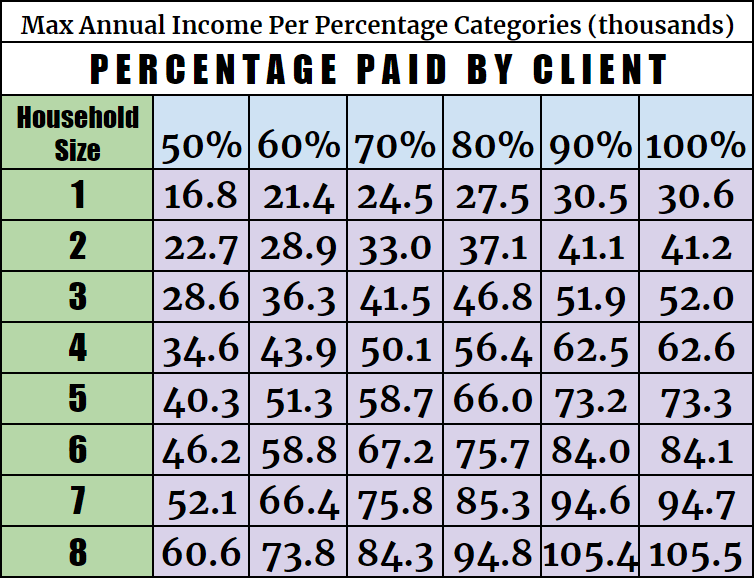FIND YOUR LIGHT: The Prismatic Micro-Grant Fund
Receive communal support for transgender vocal training!
How It Works
Find Your Light is run by Prismatic Speech Services and managed by the Guilford Green Foundation, a Greensboro-based non-profit which supports the local LGBTQ community. Funds raised will be used to partially cover trans vocal training for interested clients living below or close to the poverty line. Sessions are currently limited to fortnightly meetings to ensure widespread availability.
If you are able, help the trans community overcome financial barriers: Make a tax-deductible donation to Find Your Light.
How Eligibility is Determined
To receive coverage, an interested client must determine the annual income of their household and the number of people in that household; with that information, one can determine the percentage of costs the client must pay:

Read more about Prismatic Speech Services' pricing.
Proof of Eligibility
The interested party must submit at least one document from the following list to verify their household's income to Prismatic Speech Services. We accept the following:
- A copy of your most recent tax return
- A month of paycheck stubs
- A copy of a bank statement which verifies unemployment/worker’s comp/alimony/child support payments
Why Give to find Your Light?
Self-Perception of Voice Impacts Quality of Life
No matter your identity, a negative self-perception of one's voice or communication style results in a lower quality of life (Murry, Medrado, Hogikyan, & Aviv, 2004). In the transgender community, this dissatisfaction is oftentimes correlated to self-perception of the voice as accurately representative of their gender (Hancock, Owen, Siegfriedt & Brundage, 2009; Hancock, Krissinger, & Owen, 2011). This manifests in anxiety when voicing feelings and opinions in professional and social situations, restrictions on participation in activities of daily life, and can impact many other aspects of one's life (Hancock, 2017). Transgender vocal training is an option for addressing these anxieties and finding unity and peace with one's voice; however, due to societal discrimination, access to this vital service remains restricted.
Help Transgender People Overcome Immense Financial Barriers
It is well-researched that transgender people, particularly those at the intersections of multiple marginalized identities, face extreme adversity. One-third of the transgender population lives in poverty, and the transgender unemployment rate is 300% higher than the general population of the US; these statistics disproportionately impact those who experience multiple axes of oppresion, such as transgender women of color (James, Herman, Rankin, Keisling, Mottet, & Anafi, 2016). Transgender people face financial discrimination across all contexts of their lives, including when accessing housing, healthcare, bank-related services, legal identification, financial aid, and education (CAP, 2015). These all have a significant negative impact on trans people's ability to afford basic necessities such as shelter, food, and healthcare: one-third of survey respondents said they did not seek medical care when needed because they could not afford to be seen (James et al., 2016).
Build Community
In addition to the essential support you are providing transgender people living in poverty, your money will support Prismatic Speech Services, a transgender-owned private practice in Greensboro, NC. This means that your donations will not only directly help those in need; you will also facilitate the development of a transgender-owned medical practice. This fosters a feeling of community which in turn improves health outcomes for transgender people by improving self-esteem and providing a safer space for work that inherently requires a great deal of vulnerability (Vastine & Twena, 2018; Austin & Goodman, 2017).
Committed to Accessibility
Prismatic Speech Services seeks to serve the underserved, and that means reducing as many barriers to access as possible. To decrease the impact of location, Prismatic Speech offers voice services online using telepractice, or delivery of therapy services via video conferencing software. Check out our telepractice page for more information!
Read More
Austin, A., & Goodman, R. (2017). The Impact of Social Connectedness and Internalized Transphobic Stigma on Self-Esteem Among Transgender and Gender Non-Conforming Adults. Journal of Homosexuality, 64(6), 825-841.
Center for American Progress & Movement Advancement Project (2015). Paying an unfair price: The financial penalty for being transgender in america. Retrieved from http://www.lgbtmap.org/file/paying-an-unfair-price-transgender.pdf.
Hancock, A. (2017). AN ICF Perspective on voice-related quality of life on american transgender women. Journal of Voice, 31(1), 115.el-115.e8.
Hancock, A. B., Krissinger, J., & Owen, K. (2011). Voice Perceptions and Quality of Life of Transgender People. Journal of Voice, 25(5), 553-558. doi:10.1016/j.jvoice.2010.07.013
Hancock, A., Owen, K., Siegfriedt, L., & Brundage, S. (June, 2009). Relationship between self perception, listener perception, and acoustic measures of femininity in transgender voice assessment. WPATH Presentation, Oslo, Norway.
James, S. E., Herman, J. L., Rankin, S., Keisling, M., Mottet, L., & Anafi, M. (2016). The Report of the 2015 U.S. Transgender Survey. Washington, DC: National Center for Transgender Equality.
Murry, T., Medrado, R., Hogikyan, N. D., & Aviv, J. E. (2004). The relationship between ratings of voice quality and quality of life measures. Journal of Voice, 18(2), 183-192. doi:10.1016/j.jvoice.2003.11.003
Vastine, W. & Twena, Y. (2018). Peer-based transgender voice and communication training: A more appropriate delivery model? ASHA Presentation, Boston, MA.

